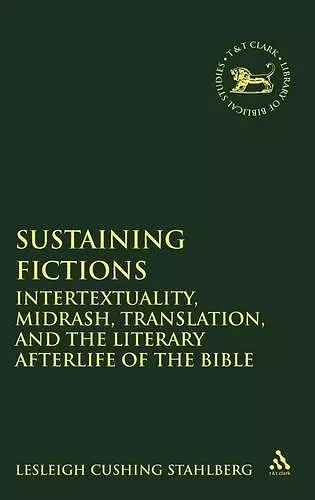Sustaining Fictions
Intertextuality, Midrash, Translation, and the Literary Afterlife of the Bible
Lesleigh Cushing Stahlberg author
Format:Hardback
Publisher:Bloomsbury Publishing PLC
Published:1st Jan '09
Currently unavailable, and unfortunately no date known when it will be back

Sustaining Fictions considers the viability of the vocabularies of literary, midrashic, and translation theory for speaking about retelling.
Even before the biblical canon became fixed, writers have revisited and reworked its stories. The author of Joshua takes the haphazard settlement of Israel recorded in the Book of Judges and retells it as an orderly military conquest. The writer of Chronicles expurgates the David cycle in Samuel I and II, offering an upright and virtuous king devoid of baser instincts. This literary phenomenon is not contained to inner-biblical exegesis. Once the telling becomes known, the retellings begin: through the New Testament, rabbinic midrash, medieval mystery plays, medieval and Renaissance poetry, nineteenth century novels, and contemporary literature, writers of the Western world have continued to occupy themselves with the biblical canon. However, there exists no adequate vocabulary-academic or popular, religious or secular, literary or theological-to describe the recurring appearances of canonical figures and motifs in later literature.
Literary critics, bible scholars and book reviewers alike seek recourse in words like adaptation, allusion, echo, imitation and influence to describe what the author, for lack of better terms, has come to call retellings or recastings. Although none of these designations rings false, none approaches precision. They do not tell us what the author of a novel or poem has done with a biblical figure, do not signal how this newly recast figure is different from other recastings of it, and do not offer any indication of why these transformations have occurred. Sustaining Fictions sets out to redress this problem, considering the viability of the vocabularies of literary, midrashic, and translation theory for speaking about retelling.
Mention -Book News, February 2009
"Stahlberg's monograph is groundbreaking in its search for more precise ways of describing retellings and in its concern for all retellings, textual and otherwise, ancient and modern. Its interaction with the history of interpretation and its interdisciplinary forays are well researched and valuable for further study." --Paul S. Evans, McMaster Divinity College, Hebrew Studies 50 (2009) -- Paul S. Evans, McMaster Divinity College
"This study comes at an opportune time...This book takes on an issue that desperately needs to be addressed, and Stahlberg is to be credited for pointing the way toward further study. Students of the Bible's reception history, in whatever period they work, will find here much to think about and much to carry forward." -Molly M. Zahn, Journal of Religion, Oct. 2009
"The volume reads very well and is engagingly written. It manages admirably to explain complex issues of both literary theory and halakic thought in an easily accessibly manner. Stahlberg is well read and in command of the areas that she explores. I also believe that this book fills a gap in the current scholarly literature. Whether later reviewers and biblical scholars will actually use this particular terminology remains to be seen, but this book has provided us with at least preliminary tools. I can therefore recommend this book warmly." -- Lena-Sofia Tiemeyer, Review of Biblical Literature -- Lena-Sofia Tiemeyer * Review of Biblical Literature *
ISBN: 9780567027092
Dimensions: unknown
Weight: 535g
256 pages